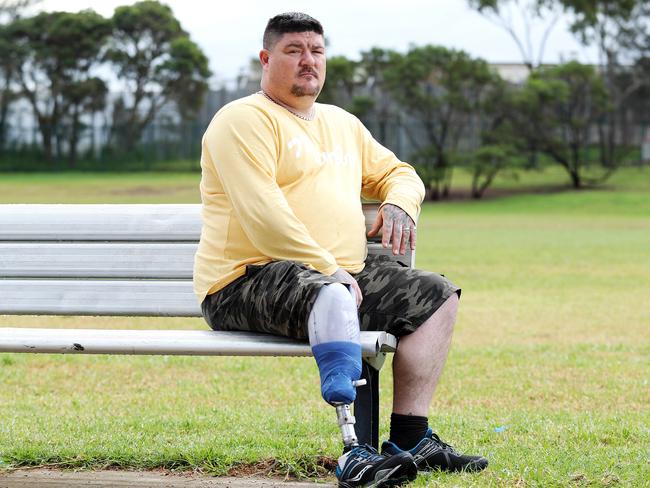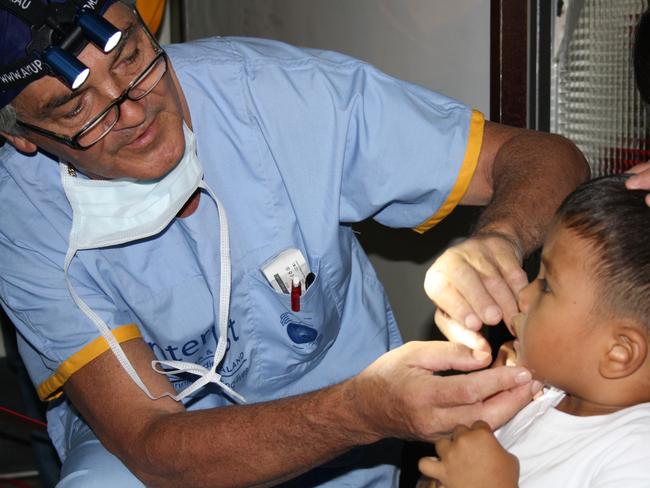Body Integrity Identity Disorder: Sydney man wants healthy arm amputated
David Openshaw took drastic measures to get his healthy leg amputated, as a result of suffering from a very rare disorder in which his body wanted to remove limbs it did not recognise.
NSW
Don't miss out on the headlines from NSW. Followed categories will be added to My News.
A top surgeon has asked medical ethics experts for advice on amputating a Sydney man’s perfectly healthy arm because the man finds his limb distressing.
Associate Professor Peter Haertsch, a plastic and reconstructive surgeon who specialises in gender reassignment, said the man, a father in his 30s, has an extremely rare condition called Body Integrity Identity Disorder, where his brain did not recognise the fully functioning arm as part of his body.
“He was referred to me with a psychiatric letter and he is a perfectly normal guy, he has had a plaster cast on his left arm and he has had it hidden from his view since his early teens,” Dr Haertsch said.
“He has been to see numerous psychiatrists and he wants the limb removed and he hasn’t found anyone prepared to do it.
“He has three eminent psychiatric opinions that he does suffer from this disorder and he would benefit from having his limb removed.”
Dr Haertsch has written to the Sydney University Medical Ethics committee seeking guidance abut the ethics and morality of amputating the arm at a Sydney hospital.

Dr Haertsch was first confronted with the disorder in 2009 when Airds man David Openshaw arrived at Concord hospital’s burns unit with a serious frostbite burn to his right leg after he’d soaked it in dry ice for six hours.
“I wanted it amputated. It’s not that I hated it, but it didn’t belong to me. Over the years I’ve come up with a lot of desperate ways to do it from laying on a train track, jacking the car up and kicking it out, but when we found the name of this condition and a lot of people have used dry ice and it is safer. It fully froze,” Mr Openshaw, a 42-year-old father of four, told The Sunday Telegraph this week.
MORE FROM JANE HANSEN:
All NSW hospitals’ elective surgery wait times revealed
Irony of being a heavily-tattooed anti-vaxxer
Dr Haertsch, who carried out the amputation of Mr Openshaw’s leg, said: “I had never heard of it until David Openshaw stuck his leg in dry ice for several hours and because it was a frost bite, a cold burn, he was admitted under our care.
“It was obvious to us he was suffering from this condition for a long time. It was amputated only because it became life threatening because it became septic.”
The first case of BIID was reported in the 18th century, when a French surgeon was held at gunpoint by an Englishman who demanded that one of his legs be removed.
“Sometime later he sent him a cheque thanking him for removing a permanent impediment to his happiness,” Dr Haertsch said.

Studies in the US have shown people with the disorder do not recognise the affected limb in their mind map of the body after having magneto encephalograms done on their brains.
“I think it is not a psychiatric condition but a condition associated with the temporal lobe and the fact the body map is not represented in the map,” Dr Haertsch said.
Clinical Associate Professor of Psychiatry at the University of Sydney Christopher Ryan diagnosed Mr Openshaw and has seen around eight cases.
“Like most psychiatric disorders there is some brain abnormality as well, but it manifests as people being tremendously distressed about the presence of what they regard as an extra limb,” Dr Ryan said.
“They have the requisite number of limbs but it seems the internal map all of us have about our bodies seems to have failed with people with this disorder, so people may view say their left leg, even though they know they have a normal leg, it does everything a leg does, but unlike you or I, they do not regard that leg as part of their body and its presence is extremely distressing.”

Mr Openshaw, who now uses a prosthetic leg, has no regrets.
“It felt great, I felt relieved, and it has changed my life for the better. I’ve never regretted it except I wish I did it sooner,” he said.
Mr Openshaw runs a support group for BIID and has some concerns about some people.
“In the chat group some just come in out of the blue and say ‘I want this done’, some think it is like getting your ears pierced or a tattoo,” he said, but added he had sympathy for the latest case.
“If it is a true BIID case, yes, I feel for this man,” he said.
Dr Haertsch said the latest case presented both moral and ethical issues as a surgeon and sought guidance from the ethics committee.
“The ethical issue of removing a normal limb does it derive therapeutic value I’m not entirely sure, but the patient would say yes, but the psychiatrist might say yes, but I’m not sure the ethicists would agree, but there are already a number of surgeries where normal tissue is removed for no apparently therapeutic benefit, talking about cosmetic surgery, circumcision or a kidney donor, there is not benefit for the donor,” he said.
“I can see hospital administration wringing their hands when I want to amputate a normal limb.”
